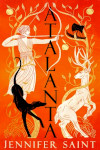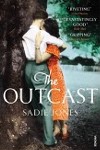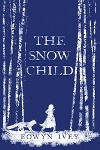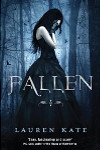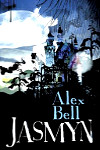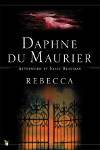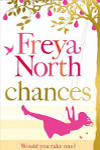Aimee Bender – The Particular Sadness Of Lemon Cake
Posted 23rd January 2012
Category: Reviews Genres: 2010s, Angst, Domestic, Magical Realism, Paranormal
Comments Off on Aimee Bender – The Particular Sadness Of Lemon Cake
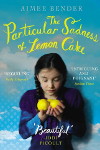
Some books really take the biscuit – and do wonders with it.
Publisher: Windmill (Random House)
Pages: 322
Type: Fiction
Age: Adult
ISBN: 978-0-099-53826-4
First Published: 2010
Date Reviewed: 22nd January 2012
Rating: 4/5
Rose has always loved her mother’s cakes, but one day she finds the enjoyment ruined – as she eats, her mother’s feelings somehow swamp her and the reality of what the woman’s life is like is distressing. In a short time she learns that this is now the case with every food, finding that eating anything at all handmade results in her discovering the feelings and thoughts of every single person who has aided in the creation of the food. She will learn a lot about her family in the process, but it will affect her life ever more.
The Particular Sadness Of Lemon Cake is a very strange book. At once depressing and intriguing, the latter for its paranormal element, it is a book that doesn’t really fit into any genres.
The reader should know that by picking up the book they are enveloping themselves in hours or days, depending on reading speed, of upset – indeed this reviewer had judged that this book was going to leave her an emotional wreck, and she read it on a dull Sunday when there was no studying to do and no reason for her to need to feel positive. It proved to be a good decision.
The story is told in the first person, and Bender’s style of writing is curiously interesting. She writes dialogue without quotations and the text itself falls somewhere between a child’s and an adult’s as she speaks as nine year old Rose. It can be hard to get used to, but as Rose gets older the mix of styles makes more sense and looses its oddness to be something very enjoyable and refreshing.
This theme of a paranormal gift could have gone horribly wrong, and let’s not forget that in fiction such as this – quite “literary” and not featuring vampires – there tends to be an emphasis on the realistic. The basic summary and Rose’s gift may not seem too fantastical for such fiction, but Bender later takes it further into realms that straddle the fence between the very imaginative and the horrifying. Yet Bender’s story is so readable and well thought out, that the weirdness doesn’t matter, and instead what matters are the feelings of Rose. It’s a sort of acceptance where you step beyond reality to embrace Rose’s world unconsciously, meaning that although you can pinpoint the fantasy, it doesn’t effect you in a way that makes it unbelievable – although there is one element that is difficult to accept and that requires an interpretation in order to read without mirth (for it could be said that in a way the book is more metaphor than literal). Simply put, the reader can emphasise with Rose, truly putting themselves in her shoes in every way. Although that doesn’t mean that Rose is a good character to read about, indeed some of her more real-life choices are quite disappointing.
The book is bogged down by depression, family issues, communication problems, and anxiety. It is one of those works where you can give it as high a rating as you want, but still have trouble saying whether you actually enjoyed it. The domestic situation it presents is one that is very real to some families – the reader is likely to know of a real-life situation similar, be it close to them or through stories in the news. As someone who grew up in a dysfunctional family, although she cannot say it was the same as Rose’s, this reviewer can report that some of the success in the reader’s mind is very likely to depend on how much they can relate to the situation. And the story is a good representation of how issues are passed on down the generations – Rose’s grandmother has problems loving others, and it’s a similar sort of issue that has passed down to Rose and her brother. The family in the book is of a dysfunctional nature that aligns with an inability to communicate.
Rose’s brother is cause for discussion that can’t happen in a review, many times you wonder what happened and why, but piecing everything together an explanation can be found in his relationship to his mother and the way she made him feel. Her actions and his do seem to align, albeit in a peculiar way. You can also see where he feels trapped, although the feeling of wanting to be alone is not explained. In fact, the lack of explanation in most cases plays a big reason why this book did not receive a higher rating.
Bender does provide stark contrasts throughout to demonstrate where the family has gone wrong and how problems, especially for Rose, could be solved. She presents the minor and secondary characters as a ray of hope, and shows the way in which relations between Rose and those people deteriorate. Hindsight may be a wonderful thing, yet one senses that Rose’s situation is so bad that she might never experience it. But even if Rose cannot see her way out at times, the positive nature of the minor characters is like a beacon when you’re reading and helps lift the mood enough to allow you to read on.
A lot has been said by others on the themes of coping with your life. While this was not the focus of my reading (I concentrated on the communication issues and negative family situation) it fits in with elements I picked up on, such as Rose’s determination to keep an old stool her father had made for her mother – Rose’s hope being to retain some of the love and presence of regular marriage between her parents. Indeed the way that Rose’s choices are disappointing collides with this topic of coping in the way that the only way Rose can live is to keep things the way they are, even at the expense of her happiness. She recognises hope and difference in her relationships with her friends and her first love, but actively pulls back from them. While not really explained, it is easy to see Rose as a guardian of her own feelings, as well as being so stuck in emotional poverty that she is too scared to try alternative ways of living. It becomes a case of a girl who is very astute at knowing how others feel, not really knowing what she wants herself. And in the poor choices she makes for her life, for surely they are poor choices, one can see how she’s become so used to her life that she doesn’t want to leave it.
The Particular Sadness Of Lemon Cake is difficult to discuss as words elude a thorough description just as they are not a part of the gifts presented. It is most certainly recommended with the advice to look beyond the text at what words cannot say.
Related Books
Barbara Longley – Heart Of The Druid Laird
Posted 9th November 2011
Category: Reviews Genres: 2010s, Fantasy, Historical, Paranormal, Romance
Comments Off on Barbara Longley – Heart Of The Druid Laird
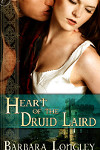
Where love doesn’t just get your average definition of a second chance.
Publisher: Carina Press (Harlequin)
Pages: 235
Type: Fiction
Age: Adult
ISBN: 978-1-4268-9227-1
First Published: 19th September 2011
Date Reviewed: 16th October 2011
Rating: 3.5/5
Sidney and her friend Zoe work and live together, but neither of them would ever have guessed that they had done similarly before. That’s until Dermot MacKay and his men turn up at their shop. Dermot is immortal, born in the fifth century, and trying to break out of his eternal existence. He knows that the key to doing this is finding the reincarnated soul of his wife. But even if Sidney’s shop holds fantastical items, it’s going to be difficult to get her to believe him and even more difficult to leave the long life he had previously wanted to get away from.
Heart Of The Druid Laird is a book that encompasses many genres, some better than others, to deliver a well-written romantic novel. However, it does start rather quickly, and the reader looking primarily for historical content should know that it’s the fantasy element that is the focus.
It can be a little weird how quickly Sidney’s friend, Zoe, accepts everything, indeed it takes less than a couple of days for her to be spouting information as though she has known it forever, and while that is in part true for the nature of her soul’s journey, a quick reminder of the contents of the women’s shop, largely presented as New Age, shows that she would be quite open to it, even invite it. Of course this leads into the whole idea of reincarnation – the reader who believes only in what can be explained may have to suspend belief in order to enjoy it.
The first half of the book is very enjoyable. The genres weave in together well, the imagery is good, the dialogues too. Sidney isn’t easily swayed by Dermot, even when she finally accepts his story. She doesn’t miraculously fall suddenly in love with him: when she has sex with him it is from pure lust, which the reader can easily recognise. For love to work the reader needs her to transition slowly, but for lust nothing needs work except chemistry, which the characters have in bounds. And even when Sidney starts to acknowledge her feelings, she doesn’t suddenly lose the plot – she remains strong, stubborn, and independent throughout. But this last clause is where the book rapidly begins to fall apart as the chapters continue on – although it is understandable that Sidney would become afraid at what might lie ahead she becomes incredibly soppy. Maybe the reader can accept some of that due to the repetition of the idea that she’s been looking for The One, but because the change happens so swiftly, and she was so strong before, it does affect the satisfaction you find in the novel. And as much as the first episodes with the fae can be acknowledged, when the entire story becomes wrapped up in fantasy and everything comes down to something so easily upturned, no matter whether or not you always knew that it came down to the fae, it becomes lacking.
However the characters are in the main very good and the story well plotted. Longley seems to have had a solid idea of where she was headed from the start, everything is tied up nicely and all the questions that you could ask that are directly related to the text are answered. Longley makes a stellar effort with the accents, even if at times some words don’t fit in, and she clearly knows her stuff.
The world-building is excellent, and even though this reviewer is more attuned to the Tudor period, what she knows of the early AD years ran alongside Longley’s creations. And Longley isn’t happy with just her two chosen time periods, she includes in her interior design Elizabethan furniture too. Longley is certainly a fan of history and this positively exudes from her work.
The sex scenes are brilliant – they are not crass, the word choice is regular, and because of this they are hotter than your standard fare. It’s easy to believe in both the couples in this book. However when Sidney worries about contraception and then lets Dermot off, and he, after they’ve had sex, says he couldn’t have kids anyway, there may be eyebrows raised. Sidney didn’t know he couldn’t have children until after the act, so she shouldn’t have let him get on with it after an almost frivolous suggestion for protection on her part. And if this man came from the fifth century… well even people with no knowledge of the period know that those who lived before, often especially those in power, tended to favour fornication and had no idea about sexual health. Maybe a disease would die a swift death in an immortal body, but the idea would surely have crossed Sidney’s mind. Or at least it should have.
While Heart Of The Druid Laird may not quite meet expectations is isn’t far from the mark and is certainly worth the time it takes. People after a bit of mystery will find it here, there’s a drop of angst for those who wish it, and those wanting some history will be pleased that Longley goes back to the past to provide the full story. If Dermot has been waiting over sixteen hundred years for his life to get somewhere he ought to be proud of his narrator’s presentation.
I received this book for review from Carina Press.
Related Books
Lee Carroll – Black Swan Rising
Posted 16th September 2011
Category: Reviews Genres: 2010s, Fantasy, Paranormal, Romance
2 Comments

Vampires and fairies take the demons down one by one.
Publisher: Bantam Books (Random House)
Pages: 417
Type: Fiction
Age: Young Adult
ISBN: 978-0-553-82557-2
First Published: 2010
Date Reviewed: 15th September 2011
Rating: 3.5/5
Please note that Lee Carroll is a name for the husband and wife team, Lee Slonimsky and Carol Goodman, and thus when I reference Carroll I am alluding to the both of them.
Garet Jones was just a jeweller when she stepped into an antiques store that she later found didn’t actually exist. The owner gave her a box, wanting her to open it, but when she looks inside it weird things happen. However it’s not so much the box at this time, but those who seem out to destroy the city that is on her mind. And who is in the right, the vampire or the fairy king?
Black Swan Rising is a mass of different ideas, stories, cultures, and time periods put together in one book, and while the first half is relatively weak and relies far too much on contemporary elements, the second half is rather special and moves away from reality to become a proper fantasy. Drawing on tales as far apart as Dracula and Swan Lake, Carroll builds a story that will see an ordinary girl take on the extraordinary.
A lot of work has been done to make the book up-to-date so that things from our era – such as Twitter, the usage of LOL on the Internet, and IPhones – are mentioned, and while it makes the book accessible to teenagers it grants the book a very short shelf life. There are also times where the contemporary just does not work, for example when a bad guy is about to unleash evil and this gets compared to a particular basketball player. It may be humorous in its own way, but it jolts you out of the story for a moment especially if you’ve never heard of the player before, which you don’t want happening when you’re speed-reading to find out what’s going to ensue.
For the most part the fantastical elements are those well-used by a lot of contemporary paranormal fantasy writers, and so many similarities can be drawn with books such as The Iron King, Jasmyn, and The Forbidden Game. However there comes a point where a true originality takes over and it is stunning. Carroll uses physics to a good extent in the book, and episodes, such as the one in the water, are quite simply excellent. So too is a later episode on land that is in a way related.
The writing is strictly okay. Garet uses the word “though” far too often, and Carroll could do with using a thesaurus instead of using the same word several times over on one page. The romance is also just all right, because the set up is rather yucky; the idea of someone being with a person who’s already slept with the family tree isn’t very nice.
It is the maturity of the latter stages of the story that make it a worthwhile read, because the writers haven’t been afraid to shock and write material that is gritty, evil, and sometimes downright disgusting yet very good – for this last one I refer to the conclusion of the water episode, it put me off my food but I couldn’t stop reading it.
It is also the concoction of history – factual, legendary, and fiction – with fantasy which makes Black Swan Rising end well and make it a book in which you are truly looking forward to the sequel. That Carroll used an older heroine – Garet is twenty-six – means the story moves a lot quicker because there is more knowledge of the world in advance; and there is a good state of confusion for the reader at the end, where you know enough, but not all, and are therefore happy to want to read on.
Black Swan Rising isn’t perfect by any means, but although it shares a great deal with other books, there is a real sense that this is just to help set some ground before it flies off in a new direction in the next book. And if it does, more power to it.
It may take a while to get into it but if you throw caution to the wind, as Garet does, you shouldn’t be disappointed.
I received this book for review from Transworld Publishing, Random House.
Related Books
Louise Douglas – The Secrets Between Us
Posted 4th September 2011
Category: Reviews Genres: 2010s, Crime, Domestic, Paranormal, Psychological, Romance, Social, Thriller
1 Comment

The truth can haunt you.
Publisher: Bantam Press (Random House)
Pages: 451
Type: Fiction
Age: Adult
ISBN: 978-0-593-06708-6
First Published: 7th July 2011
Date Reviewed: 31st August 2011
Rating: 5/5
Sarah left Laurie after he’d decided to sleep with her friend because he couldn’t understand her [Sarah’s] depression over giving birth to a stillborn baby. She travelled to Sicily with her sister in order to get away from everything and it’s there she meets Alexander and his son Jamie. Alexander’s wife has left him after a turbulent marriage and no one knows what’s happened to her, but to Sarah that’s not as important as the feelings she is starting to have for him. When Alexander suggests she move in with him and Jamie and live in the village of Burrington Stoke, where outsiders are not welcome, she joins him on impulse. But the mystery of the wife is far from over.
Douglas has created a work that binds different genres together into something quite extraordinary. What’s intriguing about it is the way in which it’s told. Douglas favours a sort of detailed abstract style – there is plenty of detail in it but sometimes it feels as though she’s left things out, the not so important things, even if in actual fact she hasn’t. It’s a unique style and means that you come away with a completely different experience than you do with so many writers who are hard to tell apart from style alone.
The story is well plotted. There is never a dull moment, during the mundane activities Douglas never lets her narrator stop thinking. The book takes place over several months yet it could just as easily have been a few days for how quickly it moves, and rather than be strange this aspect is interesting. It shows how rapidly problems can escalate.
Now Sarah is a difficult one to place on the spectrum of good or bad because she is clearly affected by the death of her child, and the reader can see times where her judgment is affected because of it where she can’t herself. Because her depression continues throughout the book one only knows her in this state. Yet a few things she does makes you wonder how much is due to her trauma and how much is due to that usual feeling of jealousy in love. Does what Sarah does sometimes illustrate control from outside, her mental state, or a spiteful character?
The book dissects the idea of a perfect living situation and shows how undercurrents can produce more harm than situations generally thought to be harmful. When everyone is living in everyone else’s pockets, everyone seems to know everything. But this feature of the village actually introduces the situation where no one actually knows anything and had there been true discretion the mystery might have been solved a lot quicker. Lives lived in public produced more secrets.
There is so much detail and thought given to the twists in the plot and the red herrings. Unlike a lot of books where at least some of the results are obvious early on, in The Secrets Between Us you really can’t say for certain what’s happened or who played a part. It’s like a whodunit only in pure “literary fiction” style and without the detective narrator.
The characters and their secrets affect the reader’s knowledge, as the reader only ever knows as much as Sarah does about Alexander. In this way the book’s title takes on a second meaning – not only are there secrets between the couple, those secrets spill over to the reader.
Some things are never used in the plot, such as the similarities between the wealthy mother and her daughter. When Virginia discusses her theories with Sarah never does the irony of the situation come into play, whether in discussion or in thought. And an idea about police involvement doesn’t get resolved.
But the few negatives are nothing when placed in the whole. Douglas is an extremely talented author whose ability to spread out a plot over a vast number of pages without once waning, still has this reviewer in awe. When she does exploit the idea of drama she still keeps a hold of the element of realism and possibility and so the book is truly spooky. And even though it’s spooky you just can’t stop reading it.
You will take away with you knowledge – the knowledge that you still have so little knowledge about the characters, which is something you don’t actually realise until you think back on the book. Douglas had you going there for a minute, thinking you know everything, but you don’t. Those secrets that were between you and the book are actually still there. And that feeling is incredibly satisfying.
The Secrets Between Us is for anyone who is looking for one of those elusive blow-me-away books, those that are off the scale for reasons you could never quite explain.
I received this book for review from Transworld Publishing, Random House.
Related Books
Shelley Munro – The Spurned Viscountess
Posted 22nd June 2011
Category: Reviews Genres: 2000s, Historical, Mystery, Paranormal, Romance
1 Comment
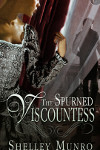
In a time when witches were burned, having a special ability could be a gift or a curse. It could even be both.
Publisher: Carina Press
Pages: 241
Type: Fiction
Age: Adult
ISBN: 978-1-4268-9058-1
First Published: 2005
Date Reviewed: 27th April 2011
Rating: 4/5
Please note that this is a revised version of an earlier book and that it is the earlier book’s release date I have referred to.
Rosalind, a young woman considered a witch by her village, took her chance and married Viscount Hastings, the man her cousin didn’t want. But there is far more to Hastings than the scar that everyone looks away from, as he comes with baggage from a doomed previous marriage. Rosalind can read people’s thoughts and comes to accept Hastings’ issues, but can he? And who keeps trying to harm Rosalind and why?
I really wasn’t sure what to expect with this book. The title suggested something clichéd, and the historic period and romance genre emphasised my thoughts. But I wanted to read more romance and it seemed a good place to begin, something away from Mills & Boon but not something erotic. This is in my attempt to get a good overview of romance and all it offers.
Aside from a weak start, which did suggest cheese, The Spurned Viscountess is rather good. There are a few repetitions employed by Munro that could have been left out, such as Rosalind always lifting her chin, and “a moue of disappointment” used a few too many times for one to appreciate the interesting description, but the story is sound and the characters agreeable.
What is great about the development of Rosalind is that it is something that affects the reader more than the character, that is to say that in the beginning Rosalind doesn’t impress very well but as the story continues it becomes easy to root for her. She doesn’t listen to advice from men to stay at home, although admittedly sometimes she should, and apart from a few stubborn moments, is a strong woman. Hastings is a good hero and his slow development into realising his true feelings is well written. That he bucks the trend of the day and doesn’t wear a white wig is fantastic. Even the bad characters are interesting.
The romance is important, as expected, but it doesn’t rule the story so much that you forget the backdrop. The mystery surrounding Hastings’ problems and Rosalind’s accidents comes to the fore many a time and is the reason to keep reading as you already know where the romance will lead. The identity of the mystery person may surprise you, the descriptions of locations delight. Although the book focuses on the two main characters you get to experience the odd social event.
As this is a romance rather than erotic romance the love scenes are few and comfortable enough to read.
There is a slight paranormal bent coming from Rosalind’s telepathy, but it is not treated in the same way as general paranormal fiction and is actually quite believable for the way in which it is written.
As a lover of the classics and what is known as “literary fiction”, although I do not like the term myself, you may wonder why I rate this book so highly. True, the writing is in a different league to the books I generally read, but for what it is it is good and it is with this in mind that I rate it. As a romance it is worthy of a read and provides that all important element – for it’s story and mystery it stays in your head after you’ve finished it.











